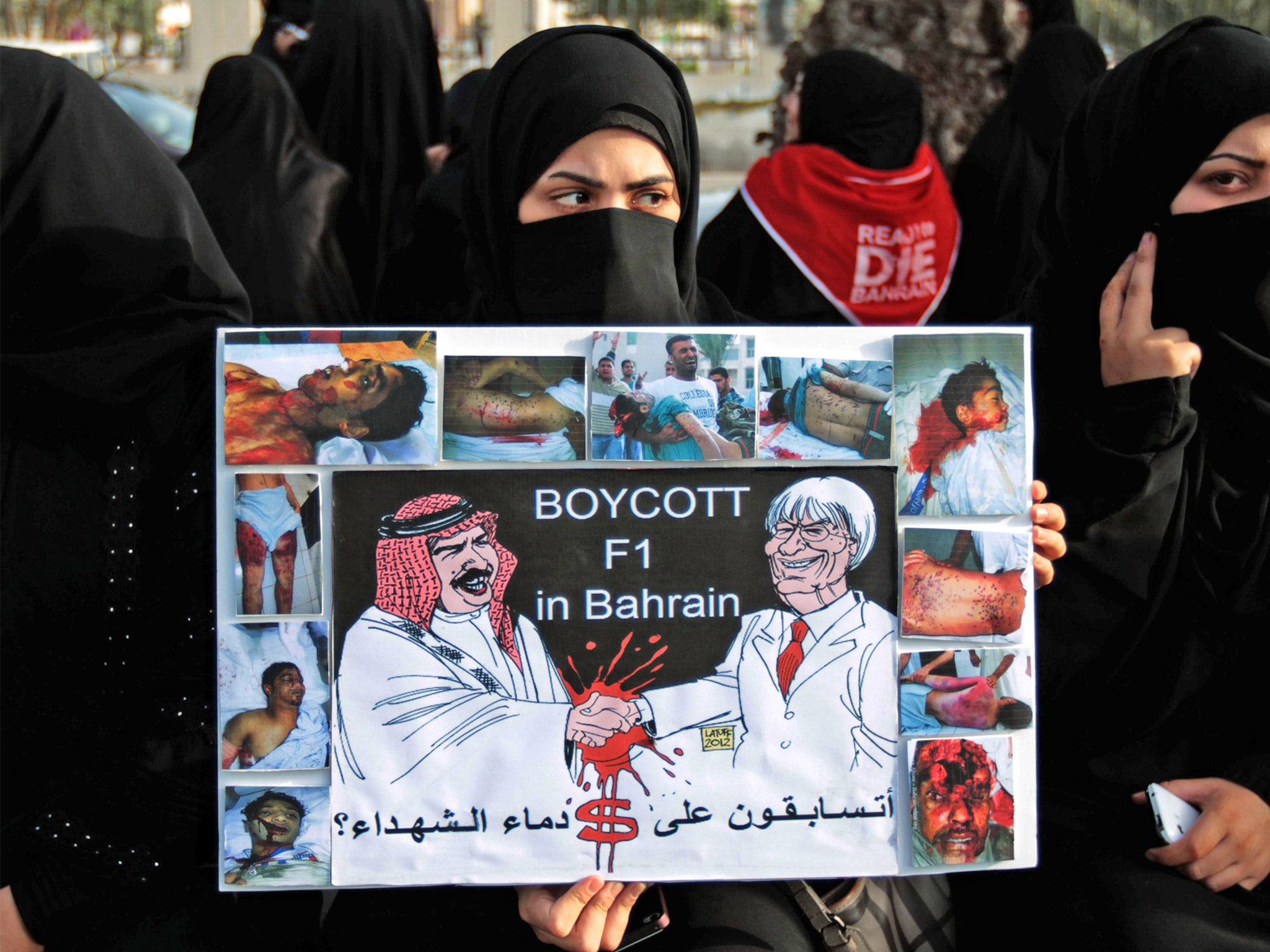F1: Tear gas used to quell Bahrain Grand Prix protests
Government accused of rounding up troublemakers ahead of lucrative Grand Prix

Your support helps us to tell the story
From reproductive rights to climate change to Big Tech, The Independent is on the ground when the story is developing. Whether it's investigating the financials of Elon Musk's pro-Trump PAC or producing our latest documentary, 'The A Word', which shines a light on the American women fighting for reproductive rights, we know how important it is to parse out the facts from the messaging.
At such a critical moment in US history, we need reporters on the ground. Your donation allows us to keep sending journalists to speak to both sides of the story.
The Independent is trusted by Americans across the entire political spectrum. And unlike many other quality news outlets, we choose not to lock Americans out of our reporting and analysis with paywalls. We believe quality journalism should be available to everyone, paid for by those who can afford it.
Your support makes all the difference.Security forces fired tear gas to disperse protesters at a secondary school in Bahrain as calls grew for this weekend’s Formula One race to be called off due to escalating violence.
The skirmishes came after the arrest of a student at the boys’ school, amid accusations that the government is arbitrarily arresting potential troublemakers ahead of the Grand Prix. The Interior Ministry said that “thugs” at Al Jabriya School in the capital Manama had been dealt with in line with the law.
Authorities have doubled efforts in recent weeks to quell unrest that has blighted the country for the past two years, since protesters, largely from the country’s Shia majority, took to the streets complaining of widespread discrimination under the country’s Sunni monarchy.
Bernie Ecclestone, the head of Formula One – the coffers of which are boosted by $40m (£26m) in hosting fees from Bahrain – has so far resisted calls to call off the race. He likened the demonstrators to those protesting Baroness Thatcher’s funeral, saying “people use these things when there is an opportunity”. His refusal to reconsider comes despite the fact that often violent demonstrations and scuffles with security forces have ramped up over the past week as protesters demand that the race is cancelled. A series of small explosions rocked the country on Sunday, adding to security concerns.
The blasts, one of which destroyed a car in the city’s financial district, caused no casualties but the Coalition of February 14 Youth claimed responsibility and threatened further action if the race was not called off, in a campaign it has called “volcanic flames”. The hacktivist group Anonymous also issued a threat to wreck Mr Ecclestone’s “little party”, calling on him to “cancel your blood race now”.
Photos and videos of the incident at the school showed young men hurling bottles at security forces before tear gas was fired. On Monday, police arrested a 17-year-old student, Hassan Humidan, at the school.
Human Rights Watch earlier this week accused the government of arresting scores of young men in a series of dawn raids since the beginning of the month. Amnesty International also condemned the decision by the Bahraini government to amend the penal code to enable it to jail for up to five years anyone found guilty of insulting King Hamad bin Isa Al Khalifah or other national symbols. “Increasing the punishment for criticism of Bahrain’s King is a further attempt to muzzle activists ahead of the upcoming Grand Prix,” said Hassiba Hadj Sahraoui, deputy Middle East and North Africa programme director at Amnesty.
A group of 20 British MPs have joined the opposition in calling for the race to be cancelled. “I think most democratic-minded people would be appalled if you allowed the Bahrain leg of the Formula One championship to go ahead amidst the most atrocious human rights violations,” the All-Party Parliamentary Group for Democracy in Bahrain wrote in a letter to the F1 boss.
The Bahraini government is attempting to bridge a growing political divide by engaging in a “national dialogue” with opposition groups. Mr Ecclestone has offered to speak to representatives of Al Wefaq, the main opposition party, as he did last year.
However, the traditional largely Shia opposiwtion political parties have lost support among many of the demonstrators, with much of the youth contending that they have lost touch. Al Wefaq has refrained from calling for the F1 to be cancelled, wary of derailing discussions.
“They don’t reflect the street,” said Sayed Ahmed a Bahraini activist now residing in the UK after being injured at protests during the Formula One last year and imprisoned and tortured in 2011. “The street are clear, they don’t want a race on their blood. The security being used is enormous – it’s simply martial law which has not been announced.”
Join our commenting forum
Join thought-provoking conversations, follow other Independent readers and see their replies
Comments